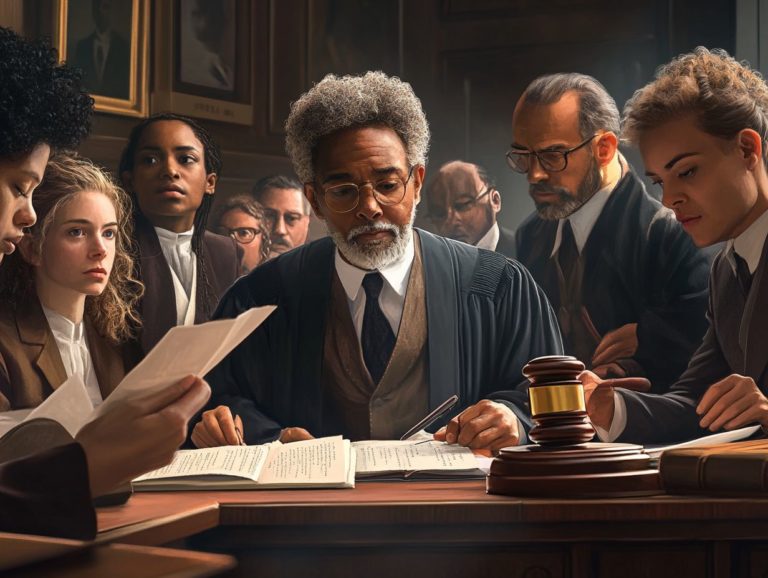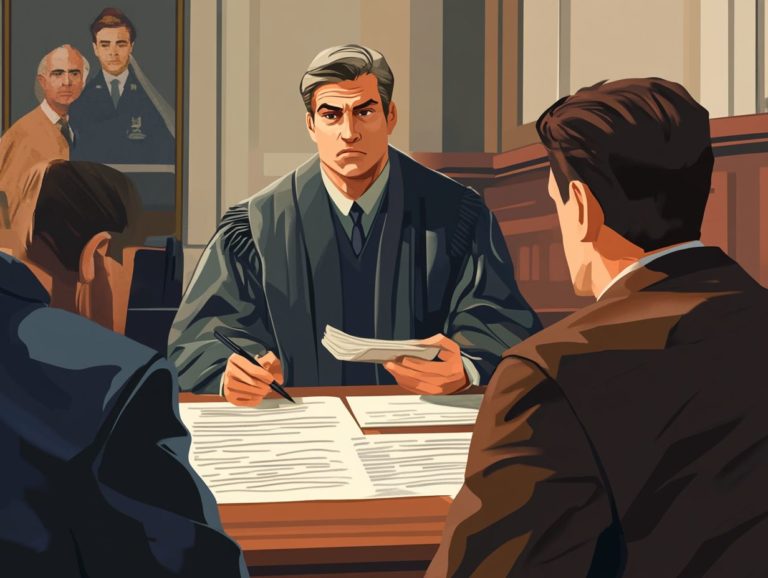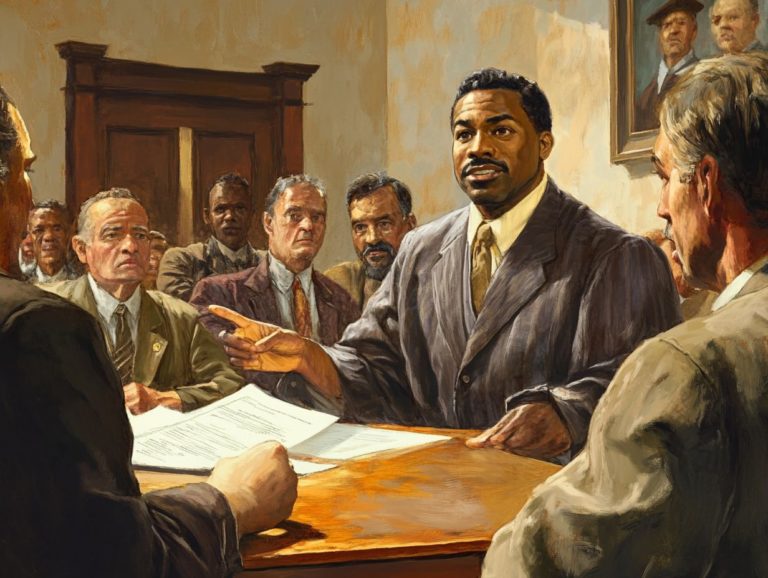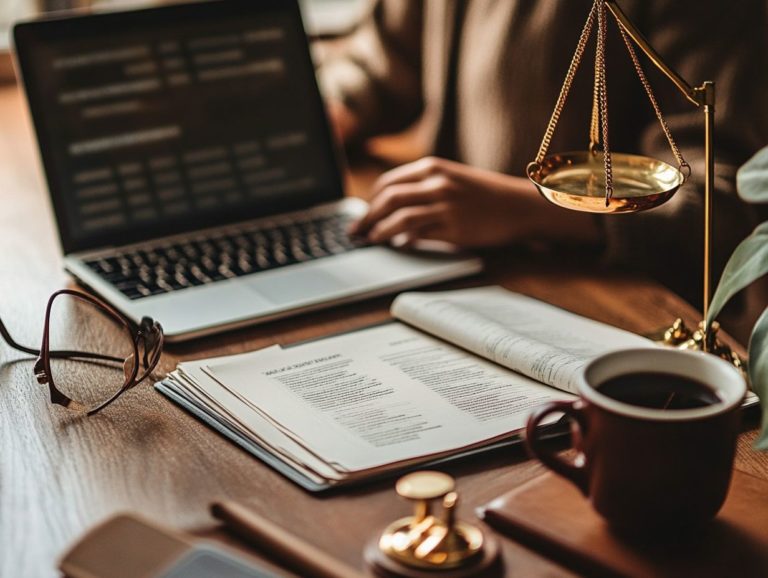How Long Does a Criminal Case Take?
Navigating the criminal justice system can be quite daunting, especially when you’re trying to grasp how long a case might take.
Several factors influence this timeline, ranging from the severity of the offense to the complexity and availability of evidence. Let s break down the legal process together, exploring the typical timeline of a criminal case, potential delays, and effective strategies to help you manage its duration.
Whether you’re involved in a case or just curious about the process, this guide provides valuable insights to support you on your journey.
Contents
- Key Takeaways:
- Understanding the Criminal Justice System
- Factors Affecting the Duration of a Criminal Case
- Typical Timeline of a Criminal Case
- Trial Phase
- Sentencing Phase
- Possible Delays in a Criminal Case
- Legal Challenges and Appeals
- Witness Availability and Cooperation
- Tips for Managing the Length of a Criminal Case
- Frequently Asked Questions
- How long does a criminal case take to go to trial?
- How long does a criminal case take to reach a verdict?
- How long does a criminal case take for a plea deal?
- How long does a criminal case take for an appeal?
- How long does a criminal case take for a misdemeanor?
- How long does a criminal case take for a felony?
Key Takeaways:
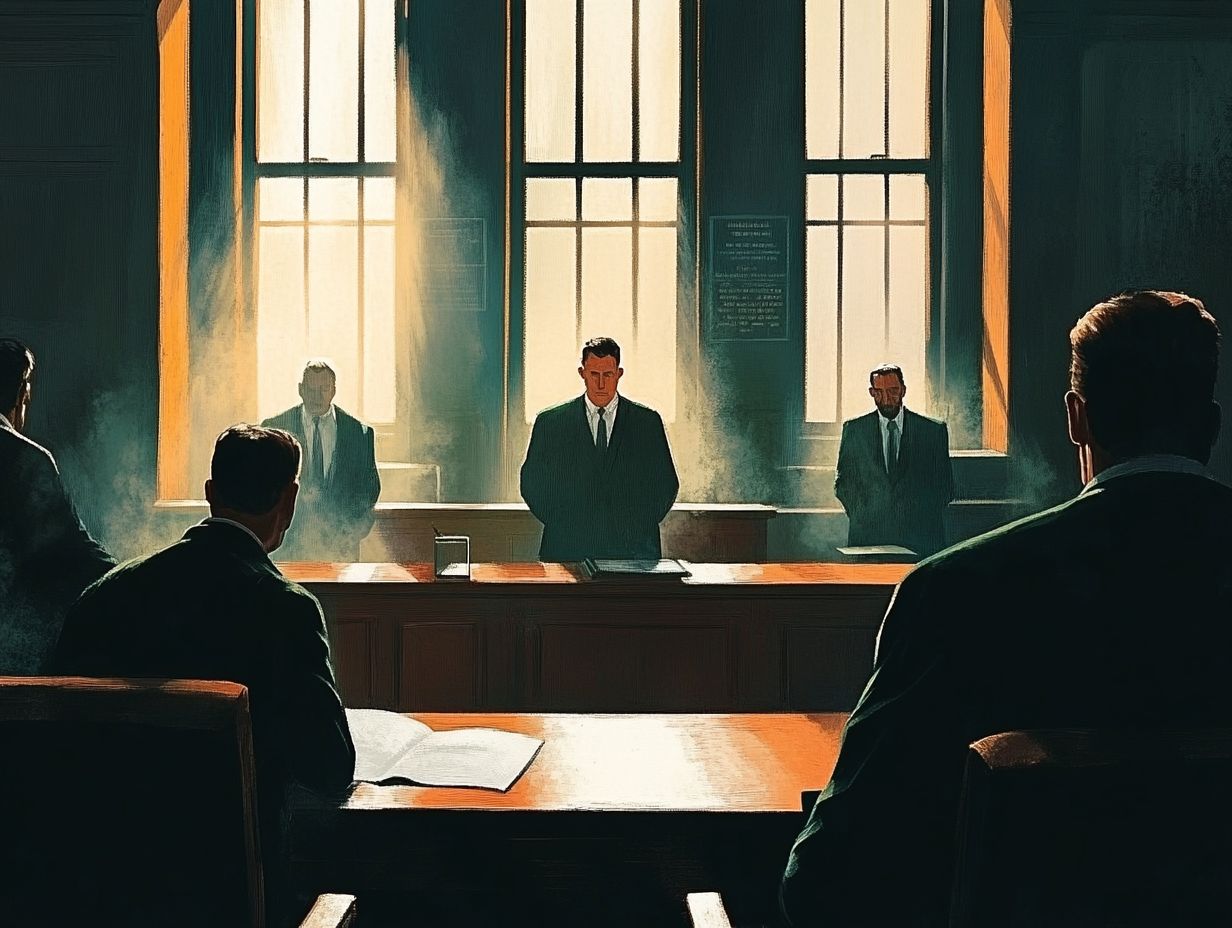
- The duration of a criminal case varies by severity and complexity.
- The typical timeline includes pre-trial, trial, and sentencing phases.
- Understanding the process can help you prepare better.
- Factors like witness availability can cause delays.
Understanding the Criminal Justice System
Grasping the intricacies of the criminal justice system is essential for effectively navigating the complexities of criminal law. This area encompasses various stages, including the first court appearance where the charges are read, plea negotiations, and trial processes, along with the rights afforded to defendants.
It also involves understanding the roles of key figures such as judges, district attorneys, and victim advocates. The system is designed to ensure everyone gets a fair chance in court, addressing both felony and misdemeanor cases with the utmost seriousness.
Overview of the Legal Process
The legal process in a criminal case kicks off with the arraignment. This is your moment to enter a guilty plea or negotiate a plea deal, a choice that can significantly shape the course of your trial and sentencing.
After the arraignment, the court will typically address bail, deciding whether you can remain free while awaiting trial or if you’ll need to stay in custody due to concerns about flight risk or public safety.
As the pretrial phase unfolds, both sides dive into discovery, exchanging evidence that may play a crucial role during the trial. This phase also includes various pretrial motions, where your lawyers might seek to exclude certain evidence or even aim for the dismissal of charges based on legal arguments.
Once all the pretrial activities wrap up, the case heads to trial. Here, both the prosecution and defense will present their evidence. If you’re found guilty, a sentencing hearing will follow, allowing the judge to impose penalties that can range from fines to incarceration.
Factors Affecting the Duration of a Criminal Case
The duration of a criminal case can be substantially impacted by several key factors.
Consider the severity of the offense; whether it s classified as a felony or a misdemeanor plays a crucial role. The complexity of the case also affects how long proceedings take.
You should also factor in the availability and reliability of evidence and witness testimony, as these elements can significantly influence the overall trial timeline.
Severity of the Offense
The severity of the offense often dictates whether your criminal case is classified as a felony or a misdemeanor, which significantly influences the entire legal process from the charges filed to the potential sentencing outcomes, including the preparation of an impact statement from victims.
This classification is crucial in shaping the strategies that both defense attorneys and prosecutors will employ. For instance, felony charges typically lead to more severe penalties and longer prison sentences, prompting both sides to take plea negotiations more seriously.
Understanding the nuances of case classification is essential; it can determine everything from trial tactics to the likelihood of a plea deal. The implications of a guilty plea are particularly significant in felony cases, as the long-lasting repercussions can impact your future employment and civil rights.
Therefore, both attorneys must navigate these complexities with careful consideration of your needs. Stay informed and empowered throughout your legal journey!
Complexity of the Case
Many things can make a criminal case complex. Factors include the number of charges, the complexity of legal representation needed, and the possibility of multiple defendants. These elements can extend the trial process and complicate the resolution of the case.
For example, organized crime cases require extensive investigations and collaboration among various law enforcement agencies. This adds layers of strategy and can significantly stretch timelines.
High-profile cases attract media attention and public scrutiny, putting extra pressure on your legal team to manage both legal aspects and reputational outcomes.
In these situations, having skilled legal counsel is essential. Attorneys must navigate complex evidentiary issues and anticipate prosecutorial tactics. Their goal is to preserve your rights while working tirelessly toward the best possible outcome.
Availability of Evidence and Witnesses
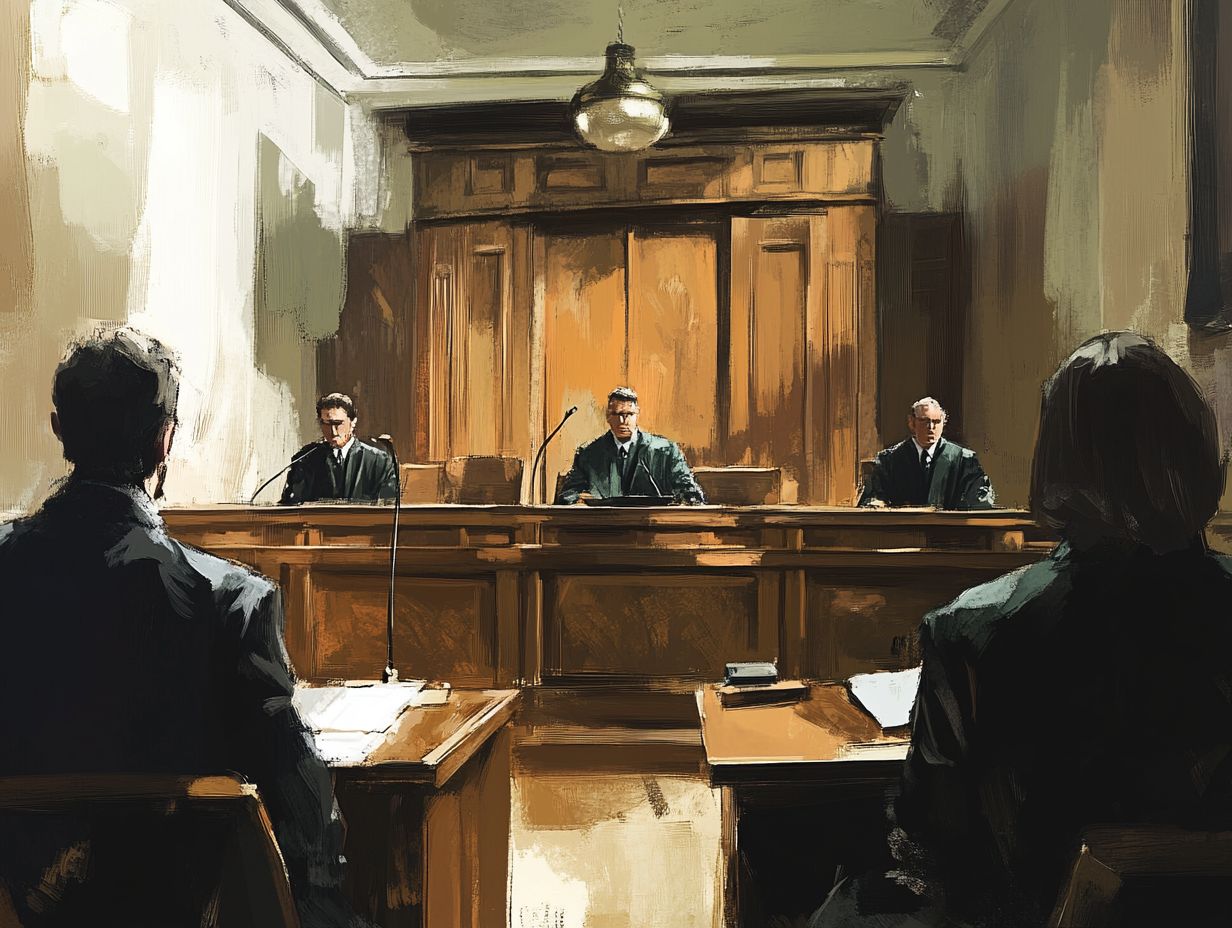
The availability and quality of evidence and the reliability of witness testimony are crucial in shaping the trial process. These factors influence the strategies used by both prosecution and defense attorneys.
The timeline of the case can shift dramatically based on how quickly and effectively evidence is gathered and how willing witnesses are to cooperate. For instance, the prosecution may face delays if essential evidence is not readily available, which could create gaps in their case or prompt a reassessment of their legal arguments.
Conversely, the defense can take advantage of any weaknesses in witness credibility or the reliability of evidence to strengthen their position.
Amid this complex interplay, it s vital to uphold the defendant’s rights, ensuring a fair trial while the dynamics of evidence and witness cooperation continue to evolve.
Typical Timeline of a Criminal Case
The timeline of a criminal case unfolds in several structured phases, starting with the pretrial phase. This phase includes arraignment, where you learn about the charges against you, and the collection of evidence.
This is followed by the trial phase, which involves jury selection and witness testimony.
Finally, the process ends with the sentencing phase, where the judge makes a decision based on the case outcomes.
Pre-Trial Phase
The pre-trial phase is crucial as it includes essential activities like the arraignment, bail hearings to establish your pretrial release conditions, and evidence collection that lays the groundwork for the trial.
During this time, both your defense attorney and the prosecutor engage in strategic planning that can significantly shape your case. For your defense, understanding the evidence is key to crafting preemptive arguments and motions that might lead to a dismissal or reduction of charges.
On the prosecution’s side, they must fortify their case by consolidating evidence and ensuring they meet all legal obligations. This creates a strong foundation for their trial presentations. These pretrial maneuvers aren t just bureaucratic rituals; they can change the entire outcome of your case!
Trial Phase
The trial phase is an important part of the criminal justice system. It includes jury trials, where witness testimony, legal strategies from both defense and prosecution, and the presentation of evidence come together to determine the defendant’s fate.
In this complex process, jury selection is the crucial first step. Potential jurors are asked questions to ensure they are fair and impartial. Once this phase is complete, both sides present their opening statements, outlining their cases and the evidence they plan to show.
Witness testimony is essential; it often forms the backbone of the arguments. As the trial progresses, witnesses provide firsthand accounts that can dramatically influence perceptions. Closing arguments allow each side to summarize their case, reinforcing key points and legal strategies that can shape the outcome.
Every element of this process plays a vital role in the judicial system, highlighting the complexity and importance of the trial phase.
Sentencing Phase
The sentencing phase follows a guilty plea or verdict, leading to a hearing where the judge determines the outcome. This moment can change everything, so having a strong advocate is crucial. This phase can lead to appeals or further legal actions, especially if the criminal charges carry significant weight.
During this time, many factors can influence the judge’s final decision. Legal representation is vital; an experienced attorney can advocate for factors that may lead to a lighter sentence.
Your prior criminal record will also be examined, as judges weigh past behavior against current charges. Additionally, victim impact statements can be very influential. These statements provide personal insights into the crime’s effects, evoking empathy and guiding the judge’s discretion.
Considerations about the potential for appeal can shape sentencing outcomes. Both the defense and prosecution will assess the risks involved, which could influence the judge’s decision.
Possible Delays in a Criminal Case
Delays in a criminal case may arise from multiple sources. Legal challenges during the trial process, the need for appeals, or complications with witness availability can all extend the overall timeline significantly.
It s important to be aware of these factors, as they can greatly impact the progression of the case.
Legal Challenges and Appeals
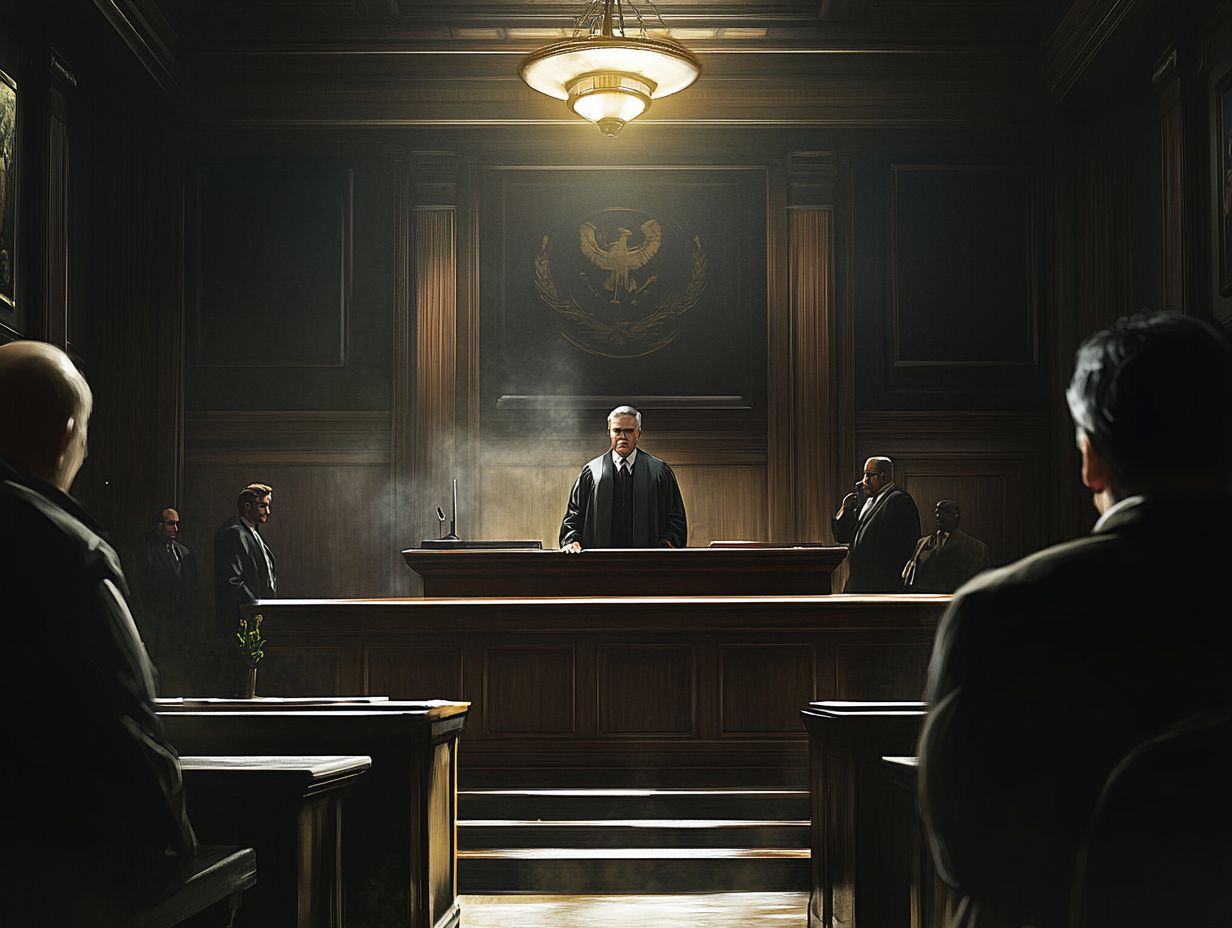
Legal challenges and appeals play a crucial role in the criminal law process. They allow you, the defendant, to contest court decisions and seek to overturn verdicts. But this can cause big delays in court proceedings.
These challenges often arise from various factors, such as procedural errors during your trial, ineffective representation, or newly discovered evidence that could sway the outcome in your favor. You might choose to pursue an appeal to a higher court, arguing that legal errors affected the verdict.
The appeals process is lengthy and complex, involving written briefs, oral arguments, and thorough scrutiny by appellate judges. Depending on your case specifics, possible outcomes may include:
- Upholding the original decision
- Reversing the verdict
- Remanding the case for a new trial
Each of these possibilities can significantly reshape your future.
Witness Availability and Cooperation
Witness availability and cooperation are essential to the criminal case timeline. Delays from uncooperative witnesses can complicate evidence collection and hinder the trial process.
It s crucial to ensure that witnesses feel safe and supported, as this impacts their willingness to testify and the integrity of judicial proceedings. Legal professionals use strategies like witness protection or technology for remote testimonies to encourage cooperation.
Building rapport with potential witnesses fosters trust, encouraging them to share vital information. This cooperation not only speeds up the trial process but also enhances the justice system’s effectiveness, allowing for a thorough examination of the facts surrounding the case.
Tips for Managing the Length of a Criminal Case
Effectively managing the length of a criminal case requires a clear understanding of legal obligations. Collaborating closely with a skilled attorney, who knows the criminal justice system, is essential.
This expertise will help you navigate the complexities of the trial process with confidence and efficiency.
Working with a Skilled Attorney
Having a good lawyer is vital for a favorable outcome. Their advice can greatly affect plea deals and trial strategies.
With a knowledgeable defender by your side, your legal rights are safeguarded. They expertly navigate the critical nuances of the law. The complexities of the criminal justice system can be daunting, filled with intricate rules and procedures that might elude the average individual.
A good defense attorney grasps the law s intricacies. They also bring experience that can help negotiate with prosecutors. This expertise allows them to work toward reducing charges or pursuing alternative resolutions that may not be immediately evident. Ultimately, this provides you with a strategic advantage that can greatly enhance your chances of success.
Understanding the Process and Being Prepared
Understanding the legal process and being well-prepared can significantly impact the duration and outcome of a criminal case. This enables you to navigate court proceedings with greater confidence and clarity.
When facing legal challenges, it’s crucial to know what to expect at each court appearance. Familiarizing yourself with the courtroom environment, procedures, and timelines associated with your case is essential. Recognize the roles of judges, attorneys, and juries, as well as the importance of gathering evidence and witness statements early on.
Preparation helps alleviate anxiety. It also equips you to make informed decisions as your case unfolds. Being proactive and informed gives you the power to manage your case thoughtfully and strategically, which ultimately allows you to advocate more effectively for your interests.
Frequently Asked Questions
How long does a criminal case take to go to trial?
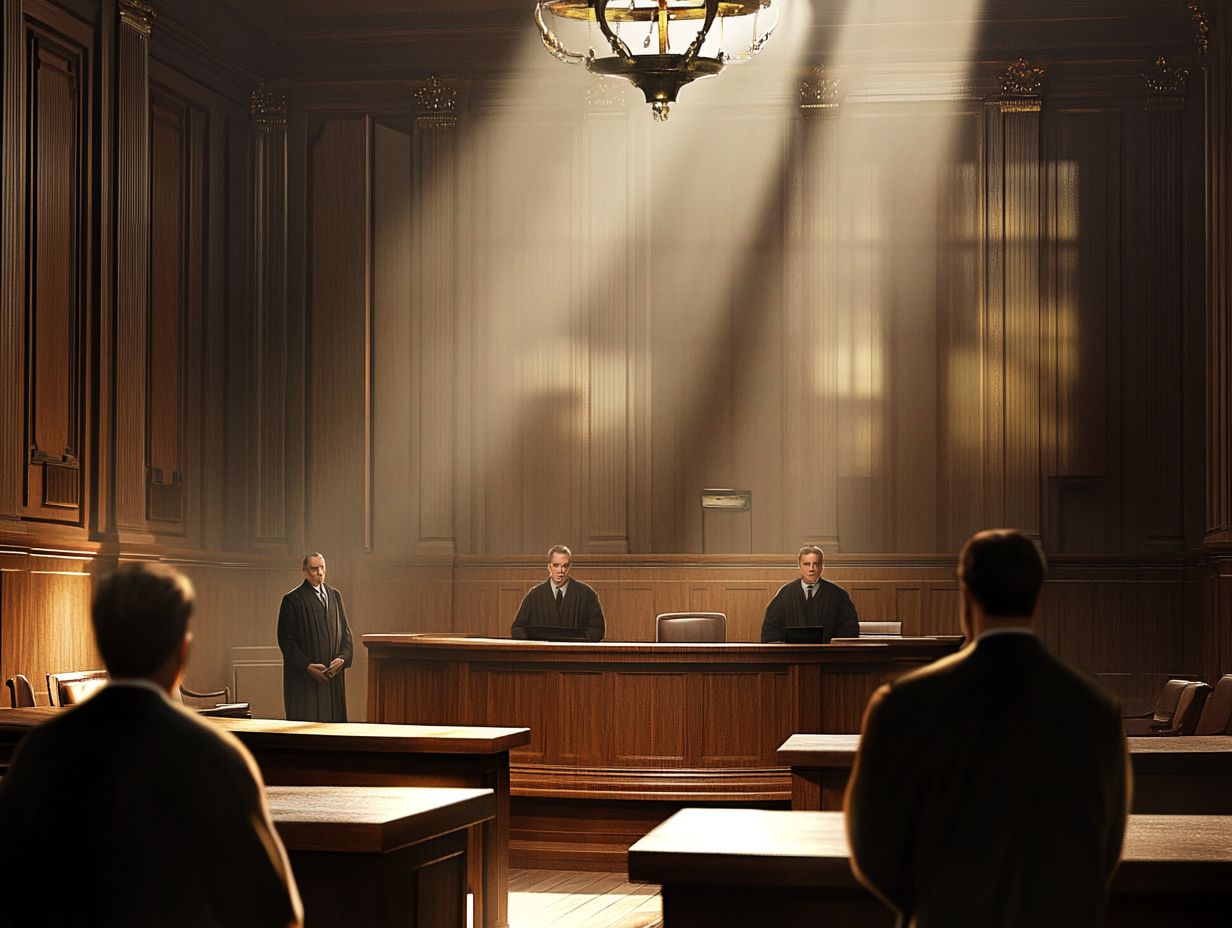
The time it takes for a criminal case to go to trial can vary widely. Factors include case complexity, witness availability, and the court’s schedule. On average, it can take anywhere from several months to over a year for a case to go to trial.
How long does a criminal case take to reach a verdict?
The length of time it takes for a criminal case to reach a verdict also varies depending on the circumstances. In some cases, a verdict can be reached within a few hours, while in others, it may take several days or even weeks for the jury to come to a decision.
How long does a criminal case take for a plea deal?
The time it takes for a plea deal to be reached depends on the willingness of the defendant to negotiate and the complexity of the case. In some situations, a plea deal can be reached quickly, while in others, it may take several months to come to an agreement.
How long does a criminal case take for an appeal?
If a defendant wishes to appeal their conviction, the process can take anywhere from several months to a year or more. This is because the appellate court must review the case and make a decision, which can be a lengthy process.
How long does a criminal case take for a misdemeanor?
Misdemeanor cases typically move through the legal system more quickly than felony cases. Depending on the court’s schedule and the complexity of the case, a misdemeanor case can take anywhere from a few weeks to a few months to resolve.
How long does a criminal case take for a felony?
Felony cases are typically more complex and can take longer to resolve. It is not uncommon for felony cases to take several months to a year or more to go to trial or reach a plea deal.


